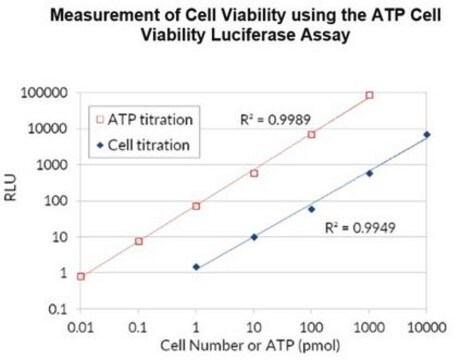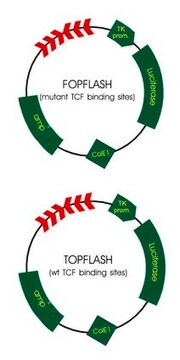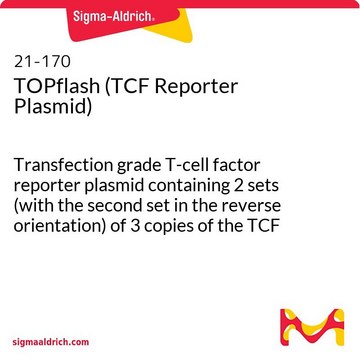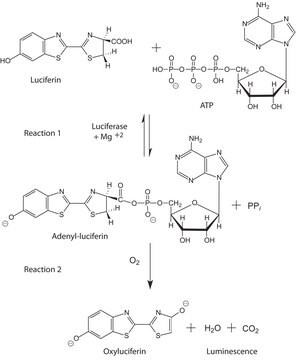SCT152
Firefly/Renilla Dual Luciferase Assay
Flash-type dual luciferase assay that allows measurement of both Firefly and Renilla luciferase activity in the same sample with high sensitivity and linearity.
Synonym(s):
Firefly Luciferase Assay, Dual Luciferase Assay, Bioluminescent Assay
About This Item
Recommended Products
technique(s)
cell based assay: suitable
detection method
chemiluminescent
shipped in
ambient
General description
The Firefly/Renilla Dual Luciferase Assay allows measurement of both Firefly and Renilla luciferase activity in the same sample with high sensitivity and linearity. Firefly luciferase activity is measured first, then Renilla Luciferase Assay Buffer 2.0 is added to simultaneously quench firefly luciferase activity and measure Renilla luciferase activity. Renilla Luciferase Assay Buffer 2.0 quenches the firefly luciferase activity to the level of untransfected cells, allowing sequential measurement of firefly and Renilla luciferase activity in the same sample. This is a flash-type assay that requires luminescence to be measured immediately after adding the detection reagents to the luciferase sample. Firefly signal decays over the course of about 12 minutes, while Renilla signal decays over the course of about 2 minutes, although this may vary depending on enzyme levels.
Application
Cell Signaling
Live Cell Dye
Components
2) Firefly Luciferase Assay Buffer 2.0 (CS224591): 15 mL
3) D-Luciferin (CS224551): 3 X 1 mg
4) Renilla Luciferase Assay Buffer 2.0 (CS224580): 15 mL
5) Aquaphile Coelenterazine (CS224581): 3 X 200 µg
Physical form
Storage and Stability
Disclaimer
Storage Class Code
10 - Combustible liquids
Certificates of Analysis (COA)
Search for Certificates of Analysis (COA) by entering the products Lot/Batch Number. Lot and Batch Numbers can be found on a product’s label following the words ‘Lot’ or ‘Batch’.
Already Own This Product?
Find documentation for the products that you have recently purchased in the Document Library.
Articles
Low cost and high performing bioluminescent Firefly Luciferase and Renilla Luciferase assays for gene reporter and ATP cell viability experiments. Benefits of dual luciferase assays also discussed.
Our team of scientists has experience in all areas of research including Life Science, Material Science, Chemical Synthesis, Chromatography, Analytical and many others.
Contact Technical Service






